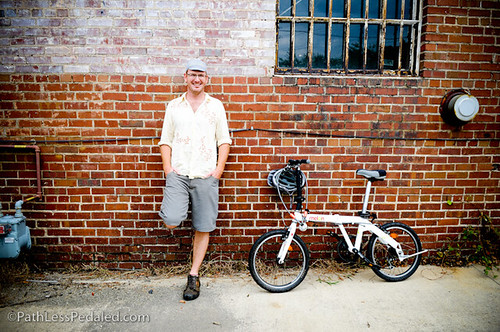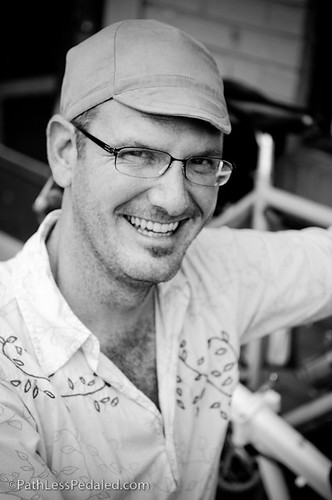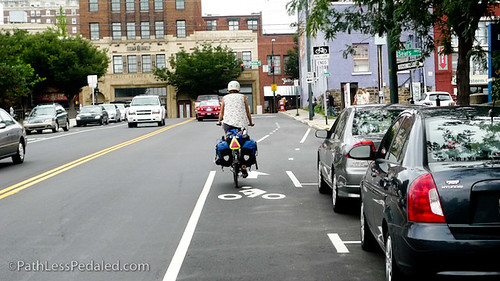Profile: Mike Sule – Asheville On Bikes
It’s just a hunch, but I doubt many bike advocacy groups began their lives on the pages of a parade application. I met with Mike Sule, one of the “quorum” that makes up Asheville On Bikes – Asheville’s only bike advocacy group.

AoB began four years ago when someone asked Mike if he and others would want to be in Asheville’s annual holiday parade. The parade asked for an organization’s name, under the gun Mike made up the name “Asheville on Bikes,” little did he know that name would stick around 4 years later. Despite being an ad hoc organization, they had little problem convincing people to dress up and ride their bikes in the parade. The sight of costumed bicyclists from different walks of life was enough to please the judges and they won $750 that year.
Of course, the knee-jerk reaction would be to throw a big party, but Mike and a few others saw that they had an opportunity to do some good. The money was put towards getting some of the city’s first bicycle lockers.

Since those early efforts, Asheville on Bikes has put on community rides and events, as well as help to create a Bicycle Master Plan for the city of Asheville. One of their most successful projects, Mike tells me, is an event that they called “Step Right Up.” With the help of the Bike/Pedestrian Taskforce and GetThereAsheville, they organized a political forum during the local elections. They had a soapbox and candidates had to do a stump speech addressing multi-modal transportation. They were expecting a small turnout but got over 100 people to attend.
While he doesn’t think the forum swayed the results of the election, he does think it made a significant impact on the community. For the first time, transportation was seen as a campaign issue. Even the local independent weekly began asking candidates their stance on transportation.
Despite these victories, Asheville is still a very conflicted city in terms of transportation. We talked about the recent Urban Velo article about Asheville that brought to light lots of obstacles and frustrations that cyclists face in Asheville. We also discussed some of the new bike infrastructure that the city was beginning to put in.
During our week in Asheville, we were pleased to see sharrows and bike lanes but were often puzzled by their placement. Of the few bike lanes in the city, many of them tended to be “door zone” lanes. Sharrows, similarly, were placed in such a way that they would direct cyclists into opening doors.

Mike understood the problem and reluctantly summoned up the argument that most cities and bike advocates put forth when they first add bike infrastructure – “breadth vs. depth.” Cities want to accomplish as much as they can with as little money, so bike network implementation is sporadic and usually coincides with the already-planned repaving of a street. There is no unified implementation plan so bike lanes and sharrows go to nowhere. Further, because the infrastructure is so new, traffic engineers don’t quite understand the design nuances, and bicycle advocates fear that by demanding too much too soon (like proper placement) they will end up with nothing. It’s a Pyrrhic victory at best.
We both agreed that educating the community in terms of the rights and responsibilities of cyclists was crucial. Mike is looking into becoming a League Certified Instructor in the near future. As progressive as Asheville is, it is still undoubtedly in The South, with a road culture that is not used to bikes as transportation.
I, of course, had to ask him about the “firefighter incident” which has become notorious to the point of urban legend in bicycle advocacy circles. For those that don’t know the story, last year, an off-duty firefighter shot a gun at a cyclist who was riding with his child because the firefighter thought the cyclist was endangering his child. The bullet passed through the helmet and the cyclist, thankfully, was not killed.
Mike tells me he was out of town at his parent’s house in Jersey when the incident happened. He woke up one morning and saw that his phone and email were exploding with messages. Like the rest of the cycling community, he was stunned at the news and was frantically gathering information about the incident, since he knew he was going to be contacted by the press to comment.
The “firefighter incident” both worked to anger and unify the cycling community. The collective unspoken fear of cyclists around town manifested itself in such a horrific event. Mike and other bike advocates tried to channel the anger into something productive. The event opened up conversations with the mayor who could no longer deny that cyclist safety was a real and important issue, when families were being shot at in the street.
Mike tells me that the irony is that the victim in the incident was not what you thought of as your typical Asheville cyclist. He wasn’t a “bleeding heart liberal” but a NASCAR dad. In a whole different context, the two men could have found themselves sharing a beer together. But just because one of them was on a bicycle, it created a chain of incorrect assumptions and misdirected anger that led to a firefigher shooting a cyclist in the head. The firefighter, I’ve been told, only served four months before being released.
Conversation drifts back to the Urban Velo article. “This is a struggle. It’s not easy,” Mike says of making change in Asheville. It’s important to show the struggle, to show how towns are trying to reshape themselves because it brings hope to other advocates that feel like they are working in a vacuum. He talks longingly about plans of a greenway along the French Broad River that he hopes to someday ride. He knows it probably won’t be complete for another 20 years and he knows it won’t be easy, but with any luck, Mike and Asheville on Bikes will still be marching along with the steady cadence of a drummer in a parade.
1 Comment
Leave a Reply
This site uses Akismet to reduce spam. Learn how your comment data is processed.
Subscribe
Patreon
Join Team Supple on Patreon
PayPal

I spent three weeks in Asheville on a work assignment in spring 2005, probably just after Mike got started on AoB. I can see that bicycle infrastructure would be a difficult sell there as they had absolutely nothing that I could find while there. And being a university town and fairly liberal to boot, you’d think bikes would be part of the mix. Like much of the eastern US the roads are narrow with few shoulders, and bikes and peds are not considered at all in small cities and towns. Asheville is a wonderful place and I’m glad to see that progress is being made.